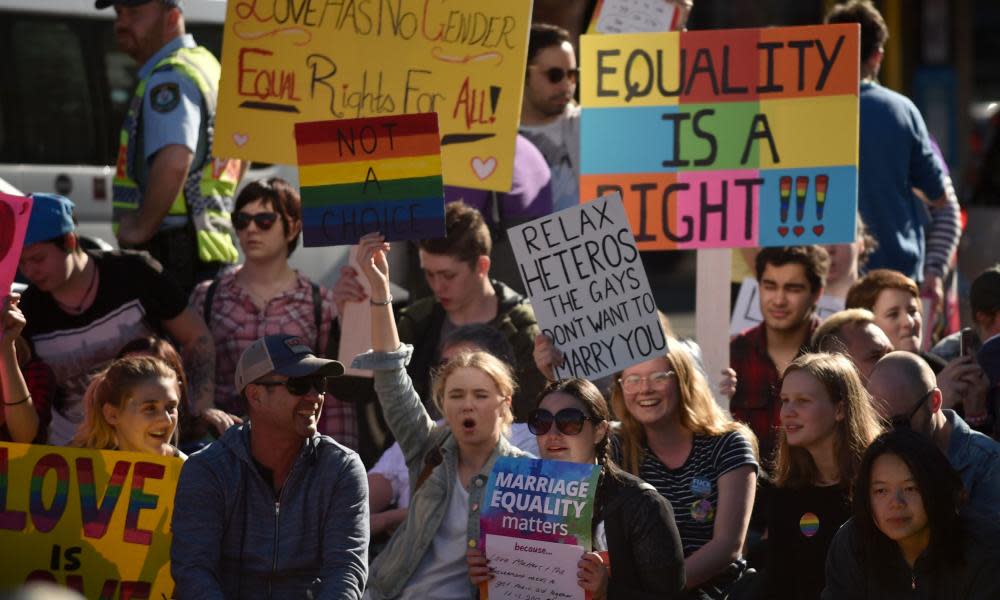Marriage equality advocates fear young people are not enrolling for survey

Marriage equality advocates are concerned that just a fraction of the expected enrolment surge before the postal survey on same-sex marriage has occurred, with young people most likely to miss out.
The Australian Electoral Commission has announced that from when the postal survey was called on 8 August until 20 August there were 36,769 new enrolments and 434,026 updates to enrolment details. This means new enrolments were just 7.8% of enrolment transactions.
In the weeks leading up to the close of rolls after the 2016 election was called on 8 May there were 132,000 additions to the electoral roll, out of a total 687,000 enrolment transactions.
Those figures indicate that new enrolments before the last election represented 19.2% of enrolment transactions, more than double the proportion seen in the current same-sex marriage postal survey enrolment surge.
A senior person in the yes campaign told Guardian Australia that leading advocates “are concerned that, contrary to the reporting, very few young people appear to be enrolling”.
“We know that younger people are more like to vote yes.
“We also know there are nearly 300,000 people under 25, and over half a million under 40, who are missing and yet, as of Monday, there were fewer than 40,000 new enrolments.”
The enrolment rate for Australians aged 18 to 24 is 85.4%, compared with 93.9% for 25 to 39 year olds, 96.5% for 40-59 and 98.5% for over 60s.
The survey, conducted by the Australian Bureau of Statistics, will be decided by a simple majority, with no adjustment for groups that disproportionately do not vote.
Australians must be enrolled by midnight on Thursday 24 August, or have submitted a valid application for enrolment, in order to vote in the postal survey on same-sex marriage.
A spokesman for the Equality Campaign, Clint McGilvray, said it was urgently calling on Australians to register and update their details, with less than 48 hours until the cut-off.
“If they want to have their say and vote yes, they have to do this now … We can’t stress enough the need for young people, and other under-represented groups like people who have rented different homes, to make sure their details are up to date,” he said.
“We need to make sure that people can’t be complacent – if they don’t update or register they can’t have their say.”
McGilvray said it was “great to see” the numbers who had updated their enrolment but the campaign’s message to young people particularly was: “You can’t delay this any further, if you back marriage equality … you have to spend two minutes to update your enrolment.”
AME has launched an ad with Ian Thorpe and his partner, Ryan Channing, urging Australians to enrol:
On Wednesday youth-oriented media sites Vice, Broadsheet, Junkee, The Feed and Pedestrian TV will engage in an enrolment drive by replacing their home pages between 5-8pm with a special splash page directing people to the Australian Electoral Commission’s electoral roll.
Amnesty International Australia campaigns manager, Michael Hayworth, said it was an “innovative, collaborative initiative ... which signals to young Australians that their votes are vital to winning a Yes result in the marriage equality postal plebiscite”.
Australian Council of Trade Unions president, Ged Kearney, said many Australian unions were actively participating in the yes campaign.
“The ACTU, consistent with our policy positions, is working to ensure that if there must be a postal survey on this issue that all people are enrolled to participate,” she said.
Wil Stracke, the campaigns officer at the Victorian Trades Hall Council, said she and two other organisers had been working full time on the campaign since the announcement of the postal survey, along with organisers at member unions.
“Our work has mostly been with the National Union of Students around encouraging people to enrol to vote, to help them with resources and support … with materials anyone can take and use.”

 Yahoo News
Yahoo News 
